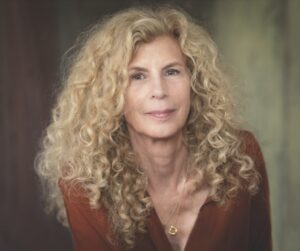The uncluttered elegance of Marie Howe’s voice has held its power over the 40-plus years she has been publishing poetry. And nowhere is it heard more lovingly than here in Provincetown. Her distinctive writing, plainspoken but profoundly complex, spans humanity’s shared experience: friendship and family, spirituality, sexuality, intimacy and love, loss and mortality.

Howe was a fellow at the Fine Arts Work Center in 1983-1984, later, a faculty member, and now serves as a trustee. As a member of the faculty, she collaborated with poet Michael Klein to edit the 1995 anthology In the Company of My Solitude: American Writing from the AIDS Pandemic.
In 1989, Howe’s younger brother, John, died at age 28 of AIDS-related complications. In 1994, as a tribute to John, Howe wrote her widely anthologized epistolary poem, “What the Living Do.”
That poem is included in her latest book, New and Selected Poems (W.W. Norton, 2024). For this collection, which contains selections from four books published between 1988 and 2017, Howe won the 2025 Pulitzer Prize for Poetry.
In “What the Living Do,” Howe addresses her brother as if he were present, seeming to conjure his spirit: “Johnny, the kitchen sink has been clogged for days.” The casualness of the writing is balanced by a sense of paralyzing grief. The poem ends with Howe finding a way past confusion and disarray and arriving at a place of light.

Howe was born in Rochester, N.Y. and received her M.F.A. in creative writing at Columbia University, where she studied under the late Stanley Kunitz. He was a founder of the Fine Arts Work Center and spent summers in his Commercial Street home in Provincetown’s far West End.
“Whether she is confronting the joys or terrors of existence,” Kunitz once said of his student, “the light that falls on the page is suffused with grace and charity. In essence she is a religious poet, that rarity among writers of her generation.”
Indeed, Howe’s poetry nearly always seems to map a spiritual journey. “Magdalene Afterwards,” the final poem in New and Selected Poems, has the feeling of grace that Kunitz described. In the poem’s scenes of forgetfulness, falling down an icy stoop, or standing quietly by a window, light is a throughline that fills the soul. A line in the poem’s final stanza is “Sometimes a joy pours through me so immense.”
The poem echoes the final lines of “What the Living Do” — where Howe is “gripped by a cherishing so deep.” In both poems, the poet is bathed in a redeeming beam of light that elevates the sorrows of the everyday in something approaching revelation.
What the Living Do
By Marie Howe
Johnny, the kitchen sink has been clogged for days, some utensil probably fell down there.
And the Drano won’t work but smells dangerous, and the crusty dishes have piled up
waiting for the plumber I still haven’t called. This is the everyday we spoke of.
It’s winter again: the sky’s a deep, headstrong blue, and the sunlight pours through
the open living-room windows because the heat’s on too high in here and I can’t turn it off.
For weeks now, driving, or dropping a bag of groceries in the street, the bag breaking,
I’ve been thinking: This is what the living do. And yesterday, hurrying along those
wobbly bricks in the Cambridge sidewalk, spilling my coffee down my wrist and sleeve,
I thought it again, and again later, when buying a hairbrush: This is it.
Parking. Slamming the car door shut in the cold. What you called that yearning.
What you finally gave up. We want the spring to come and the winter to pass. We want
whoever to call or not call, a letter, a kiss—we want more and more and then more of it.
But there are moments, walking, when I catch a glimpse of myself in the window glass,
say, the window of the corner video store, and I’m gripped by a cherishing so deep
for my own blowing hair, chapped face, and unbuttoned coat that I’m speechless:
I am living. I remember you.
From What the Living Do, copyright 1998 by Marie Howe. Used by permission of W.W. Norton. All rights reserved.



